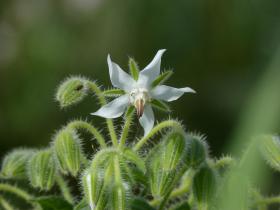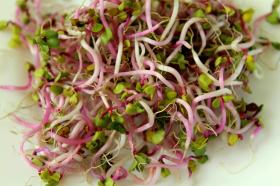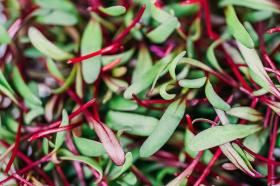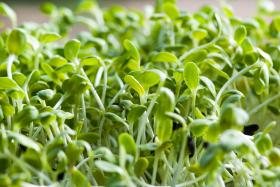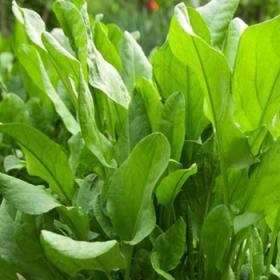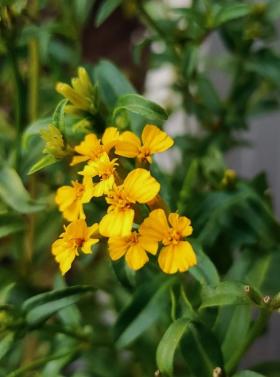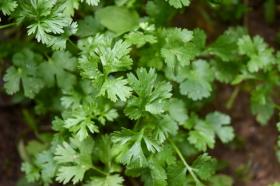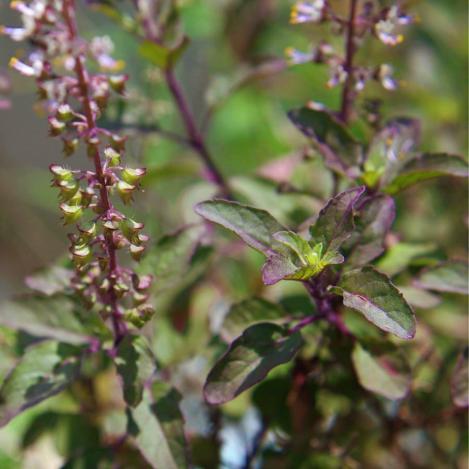
BASIL HOLY RED TULSI, organic seeds, heirloom
Ocimum tenuiflorum
Annual herb, purple green leaves. Heirloom. Demeter biodynamic seeds.Annual herb growing 30-60cm tall. Plants are upright with purple stems, slightly hairy aromatic green to purple oval shaped leaves and produce small white/mauve flowers in summer. Leaves have a slightly spicy flavour are commonly used as a flavouring in Thai cuisine. Is used to make a tea. Is sometimes grown as an ornamental. Fast growing. Traditionally used to repel insects. Also has medicinal uses. An important plant in numerous religions and cultures.
Also known as Sacred Basil, Tulasi and Tulsi.
Demeter is the quality mark for produce that has been grown biodynamically and the products that use both Demeter produce and approved processes. Named after the Greek goddess of agriculture, this quality mark ensures that food meets the highest quality standards, carefully grown, gently processed and packed. Demeter products are always certified to both organic and Demeter standards.
Demeter was founded in 1924 by Rudolf Steiner and is therefore the oldest organic farming association in Germany. The products of biodynamic agriculture are highly regarded by consumers and are produced under strict guidelines.
The Demeter trademark is the only global brand to recognise certified products and produce that is biodynamic. Our strict standards go above and beyond organic, providing you with premium quality products. Demeter products are always certified to both organic and Demeter standards.
The EU organic label sets a minimum standard for organically produced food. Demeter’s philosophy and farming methods, however, go far beyond this standard. This benefits the quality of the food as much as the environment. For example, a focus on soil quality and regeneration with required preservation of biodiversity. The consistent development of the standards and regular inspections results in the highest quality produce and products.
Biodynamic Benefits
- 100% conversion of the farm to biodynamic land
- Animals integrated into the arable farming system, supporting soil regeneration
- All farm animals are fed a 100 percent organic diet of which at least 80 percent of the feed ration for ruminants, and at least 50 percent of all other animals, must be biodynamically produced.
- A minimum of 50 per cent of the fodder comes from the farm itself or a nearby partner, supporting the ideal of a closed system.
- No painful dehorning of cows, debeaking of poultry or docking of tails. Animals are treated with respect as sentient beings.
- Use of biodynamic preparations, from herbs, minerals and cow manure, to stimulate soil regeneration and essential organism growth.
- Demeter farmers use biodynamic seed, guaranteeing no genetic modification of any kind
- Only a limited number of absolutely necessary additives are permitted in processing. Iodisation, the use of nitrates and ‘natural’ flavours are prohibited. Only flavour extracts are permitted. The EU organic standard still allows additives that Demeter biodynamic standards prohibit. (demeter.net)
Growing basil is relatively easy, and it can be done both indoors and outdoors. Here's a basic guide on how to grow basil:
1. Choose the Right Basil Variety:
- There are various basil varieties with different flavors, including sweet basil, Genovese basil, Thai basil, and cinnamon basil. Choose a variety that suits your taste and culinary preferences.
2. Starting from Seeds:
- Start basil from seeds indoors 6-8 weeks before the last expected frost date in your area. Use a seed-starting mix and plant the seeds about 1/4 inch deep.
3. Soil and Container:
- Basil prefers well-draining soil with a slightly acidic to neutral pH (around 6.0 to 7.0). If planting in containers, use a good-quality potting mix.
4. Location:
- Basil loves sunlight. Plant it in a location where it receives at least 6-8 hours of direct sunlight daily. If growing indoors, place the pots near a sunny window.
5. Watering:
- Keep the soil consistently moist but not waterlogged. Water the basil when the top inch of the soil feels dry. Be mindful not to let the soil dry out completely.
6. Temperature:
- Basil prefers warm temperatures. It is sensitive to cold, so wait until the danger of frost has passed before transplanting outdoors. Ideal temperature range for basil is around 70-90°F (21-32°C).
7. Fertilizing:
- Use a balanced, water-soluble fertilizer every 2-4 weeks or according to package instructions. Avoid over-fertilizing, as this can lead to excessive leaf growth with reduced flavor.
8. Pruning:
- Pinch or prune the basil regularly to encourage bushier growth. Pinch off the top set of leaves when the plant is about 6 inches tall. This will encourage lateral growth and prevent the plant from becoming too leggy.
9. Harvesting:
- Harvest basil leaves once the plant has reached a sufficient size. Pinch off the leaves, starting from the top, or use scissors. Regular harvesting promotes more growth.
10. Pests and Diseases:
- Keep an eye out for pests such as aphids and spider mites. Neem oil or insecticidal soap can be used for control. Basil is generally resistant to most diseases.
Packet 50 seeds


